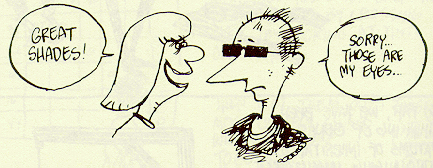Controls
In Combination

Mutations... (Figure from: Gonick and Weelis (1991), p. 80 |
Humans have 23 chromosomes: 1 sex chromosome (which determines your sex) and 22 autosomes (which determine everything else). Estimates of how many genes are on the human genome range from one to two hundred thousand. One consequence of this is that, outside of monozygotic twins, there is very little chance that two people will be all that similar. Consider, even with only 100,000 genes, just from meiosis alone something like 1.27 times 10 to the 30th different combinations of genes can be made (remember: in meiosis the chromosomes are pulled apart in a random manner).
There are also mutations, which are random errors, which can change the pattern of the genetic code, as well as processes such as crossing over, in which one part of a chromosome gets drapped over another part and the two sections swap places. Therefore, for all practical purposes, we can speak as if there are an "infinite" number of possible combinations of genes.